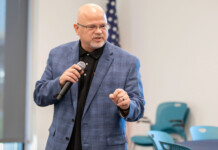
By Murray Siegel
There are three words that will dissuade a Republican primary voter from supporting a candidate, and these words are Common Core Curriculum (CCC).
Why do so many conservatives have a core hatred for CCC? If you ask them, you will hear statements about not wanting the federal government sticking its nose into our schools where decisions should be made locally. You will also hear a call for the end of incessant standardized testing of our children. It should be of interest that we can adopt CCC without any Federal oversight and without unnecessary testing.
The founding of CCC: CCC was born from a discussion at the 2009 meeting of the National Governors Association. The governors, most of whom were Republicans, voiced two concerns about public education. They expressed a concern that the schools in their states were not graduating students who were well-prepared for college and for the world of work.
Furthermore, there were large inconsistencies among states in what was taught at various grade levels and in the standard high school subjects. A fifth-grade student moving from Delaware to Oregon, in the middle of a school year, would find subject matter he had been taught in Delaware had not yet been covered in Oregon, and topics already learned by the Oregon fifth graders had not been part of the Delaware fifth-grade program to date. The sequencing and topics for Algebra 1 in Florida is quite different from the structure of the same course in Minnesota.
The governors decided to have a committee create a national curriculum that would be consistent from state to state and which was based on high, yet reasonable, expectations of student performance. Thus the CCC was born. This committee included well-respected educators including Bill McCallum, a distinguished professor of mathematics at the University of Arizona.
Federal oversight: Nothing in the CCC requires federal oversight. Of course, when you create a national curriculum, it is incumbent for the bureaucrats at the U.S. Department of Education to add their expertise, and to offer federal funds as an inducement to allow the federal experts to influence the teaching at local schools.
We in Arizona do not have to bend to the federal will, but we would need to forgo education funds sent from D.C. To place that in perspective, of the $2.1 billion state budget for K-12 education, approximately 15 percent is covered by federal dollars. Those opposed to federal oversight but wanting the high-quality nature of the CCC would simply have to find a source of funding to cover the loss of Department of Education monies.
High-stakes testing: The requirement for standardized testing is based on the federal oversight. Remove the U.S. bureaucrats, and the state and/or the local districts can decide how to insure that the students are learning what is required by the curriculum. The decision appears to be choosing which is more vital, having a high quality curriculum that allows for student mobility or overcoming federal requirements by creating means to increase state/local revenues to compensate for lost dollars from Washington, D.C.?
What do you think?
As a teacher of mathematics with 42 years of experience working in all grades from first grade to graduate school, I will have more comments on the mathematical portion of CCC in a later article.
Murray Siegel is a Maricopa resident. He has a Ph.D. in Math Ed and 42 years of teaching experience. He and his wife Sharon volunteer at Maricopa schools.










![Alleged car thief released without charges Phoenix police stop a stolen vehicle on April 20, 2024. [Facebook]](https://www.inmaricopa.com/wp-content/uploads/2024/04/IMG_5040-218x150.jpg)

![3 things to know about the new city budget Vice Mayor Amber Liermann and Councilmember Eric Goettl review parts of the city's 2024 operational budget with Mayor Nancy Smith on April 24, 2024. [Monica D. Spencer]](https://www.inmaricopa.com/wp-content/uploads/2024/04/spencer-042424-preliminary-budget-meeting-web-100x70.jpg)


